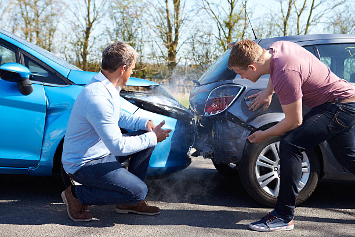
Talking to the other driver's insurance company after a car accident in Atlanta might seem like the logical next step, but it's not always the smartest one. These calls are designed to protect their company, not you. You might be thinking it would be better to just get this over with and explain what happened. But what you don't know is that, here in Atlanta, GA, that call can set off a chain of events that might work against you.
As a major Southern hub, Atlanta's mix of congested highways like I-285 and I-75, busy city streets, and constant construction zones make accidents all too common—and that's why insurance adjusters here are trained to move quickly and minimize their company's liability.
In Georgia, the state uses the modified comparative fault rule to judge fault. Basically, if you're found to be 50% or more responsible for the crash, you can't recover any compensation. And if you're found even a little at fault, your total payout could be reduced. So, every word you say to the other driver's insurance company matters, and not in a good way.
Before you even think about speaking to them, it's important to understand what's really going on behind the scenes. This is one of the benefits of talking to an Atlanta car accident attorney early on. An attorney knows how to handle the insurance process in Georgia and can protect you from making innocent mistakes that could cost you later.
Most people aren't used to dealing with insurance adjusters, and honestly, why would they be? These calls can feel casual and even friendly. The adjuster might just say they want to verify your version of events or check on how you're feeling. But that's the trap. The more relaxed you are, the more likely you'll say something that can be used against you.
Let's say you tell them you feel okay even though you haven't seen a doctor yet. Later on, if it turns out you have a more serious injury, they might question it. They'll ask, "Well, why did you say you felt fine on the phone?" That one sentence could hurt your case.
It's not that you shouldn't speak at all; it's that you shouldn't speak to them. Let your lawyer handle those conversations. That way, your rights are protected from the start, and you don't have to second-guess anything you've said.
For starters, insurance policies aren't easy to read. They're packed with legal terms and technical language. Most of us aren't trained to navigate that, and the adjusters know it.
They're actually counting on the fact that you might not understand the fine print. That's why even small details in your conversation, like how you describe your injuries or the damage to your car, can come back to bite you.
And it's not just what you say; it's also what you don't say. They might press you to give a recorded statement, hoping you'll leave something out or misremember a fact. Later, they'll use that against you and say you weren't being truthful.
This is another reason why having an attorney speak for you is such a smart move. They know how to talk to adjusters in a way that protects your claim from being picked apart later.
The biggest advantage of having a lawyer is that what they say can't be used against you the way your words can. Insurance companies know this. That's why when they hear you have a lawyer, they usually approach things differently. They're more careful, more respectful, and far more likely to offer a reasonable settlement.
Your lawyer will also keep detailed records of every interaction with the insurance company. If things ever get complicated or if a lawsuit becomes necessary, that documentation can be a huge help.
If the insurance company for the other driver is calling you, you don't have to answer. And if you do answer and realize who it is, you can tell them you're not comfortable speaking without legal representation. That's completely within your rights.
In fact, it's often better to just let those calls go to voicemail. You're not required by law to talk to them. If they leave a message, you can send it to your lawyer and let them handle the response.
And if you and the other driver happen to be insured by the same company? Don't assume they're going to look out for you. They're still trying to minimize what they pay out, and they're not going to pick sides based on loyalty.